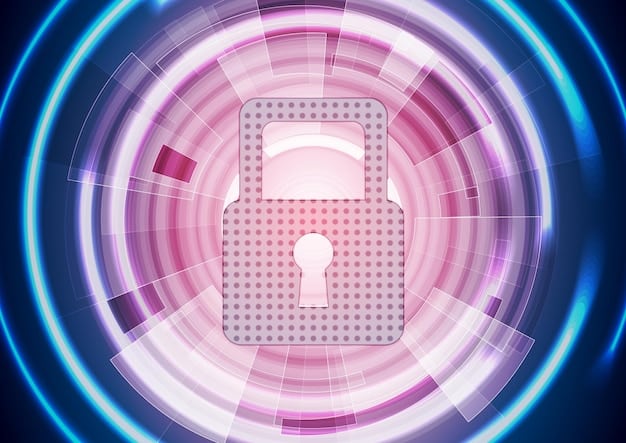The Latest Trends in US Cybersecurity Startups: Protecting Your Business

The Latest Trends in US Cybersecurity Startups: Protecting Your Business from Emerging Threats include AI-powered solutions, cloud security advancements, and zero-trust architectures, reflecting the evolving landscape of cyber threats and the proactive measures businesses must adopt.
In an era where digital assets are as valuable as physical ones, cybersecurity is no longer an option but a necessity. Businesses in the US face an increasing barrage of sophisticated cyber threats, making robust cybersecurity measures crucial for survival. This article delves into the latest trends in US cybersecurity startups: protecting your business from emerging threats, and helps you understand how these innovations can safeguard your organization.
Understanding the Evolving Cybersecurity Landscape in the US
The digital landscape is constantly evolving, and so are the threats that come with it. Businesses in the US are now facing a wider range of cyberattacks, from phishing scams to ransomware attacks, making it essential to stay ahead of the curve.
Understanding the current threat landscape is the first step in implementing robust cybersecurity measures. As cyber threats become more sophisticated, it’s vital to be aware of the latest trends and vulnerabilities.
The Rise of Sophisticated Cyber Threats
Cyber threats are becoming increasingly complex, making it harder for businesses to defend themselves. Advanced Persistent Threats (APTs), ransomware attacks, and supply chain attacks are just a few of the challenges organizations face. These threats often involve advanced techniques and tools, requiring a proactive and adaptive approach to cybersecurity.
- Advanced Persistent Threats (APTs): Stealthy and continuous cyberattacks, often state-sponsored, targeting specific organizations for data theft or espionage.
- Ransomware Attacks: Malicious attacks that encrypt critical data, demanding a ransom payment for its release, causing significant operational disruption and financial loss.
- Supply Chain Attacks: Targeting vulnerabilities in a company’s supply chain to compromise the organization’s systems and data through trusted third-party vendors and software.

The Importance of Proactive Cybersecurity
Traditional reactive cybersecurity measures are no longer sufficient to protect against modern threats. Proactive cybersecurity involves anticipating and preventing attacks before they occur. This includes threat intelligence, vulnerability management, and continuous monitoring.
By adopting a proactive approach, businesses can minimize their risk exposure and reduce the impact of potential attacks. This approach not only protects valuable data but also ensures business continuity and maintains customer trust.
In conclusion, understanding the evolving cybersecurity landscape and the importance of proactive measures is critical for US businesses. By staying informed and implementing robust defenses, organizations can protect themselves from emerging threats and maintain a strong security posture.
Key Trends in US Cybersecurity Startups
US cybersecurity startups are at the forefront of innovation, developing cutting-edge solutions to address emerging threats. These startups are focused on creating technologies that are more effective, efficient, and adaptable to the changing threat landscape.
Here are some of the latest trends in US cybersecurity startups: protecting your business from emerging threats with advanced and innovative solutions.
Artificial Intelligence (AI) and Machine Learning (ML)
AI and ML are revolutionizing cybersecurity by automating threat detection, improving incident response, and enhancing overall security posture. Startups are leveraging these technologies to analyze vast amounts of data, identify patterns, and predict potential attacks.
AI-powered cybersecurity solutions can detect anomalies in real-time, reduce false positives, and provide actionable insights for security teams. This enables businesses to respond quickly and effectively to emerging threats.
Cloud Security Advancements
As more businesses migrate to the cloud, securing cloud environments is becoming increasingly important. Cybersecurity startups are developing innovative solutions to protect cloud-based data, applications, and infrastructure.
These solutions include cloud-native security tools, automated compliance checks, and advanced threat detection capabilities. By leveraging these advancements, businesses can ensure the security and integrity of their cloud assets.
Zero Trust Architecture
The traditional perimeter-based security model is no longer adequate in today’s interconnected world. Zero trust architecture assumes that no user or device is trusted by default and requires strict verification for every access request.
Cybersecurity startups are helping businesses implement zero trust principles by providing solutions for identity and access management, micro-segmentation, and continuous authentication. This approach minimizes the attack surface and reduces the risk of unauthorized access.
In summary, US cybersecurity startups are driving innovation in artificial intelligence, cloud security, and zero trust architecture. These trends are transforming the way businesses protect themselves from emerging threats, offering more effective and adaptable security solutions.

How Cybersecurity Startups are Addressing Key Challenges
Cybersecurity startups are not just introducing new technologies; they are also addressing some of the most pressing challenges in the industry. These challenges include the shortage of skilled cybersecurity professionals, the increasing complexity of IT environments, and the need for cost-effective security solutions.
By focusing on these key challenges, cybersecurity startups are providing valuable solutions that help businesses improve their security posture and reduce their risk exposure. Below are some ways in which the latest trends in US cybersecurity startups: protecting your business from emerging threats.
Automating Security Processes
Many startups are focused on automating routine security tasks, such as vulnerability scanning, patch management, and incident response. This automation helps businesses free up their security teams to focus on more strategic initiatives.
By automating security processes, organizations can improve their efficiency, reduce their operational costs, and respond more quickly to emerging threats.
Simplifying Security Management
The complexity of modern IT environments can make security management a daunting task. Cybersecurity startups are developing solutions that simplify security management by providing centralized dashboards, intuitive interfaces, and automated workflows.
These tools make it easier for businesses to monitor their security posture, identify potential vulnerabilities, and take corrective actions. By simplifying security management, startups are helping organizations improve their overall security effectiveness.
Providing Cost-Effective Solutions
Many traditional cybersecurity solutions are expensive and require significant upfront investments. Cybersecurity startups are offering more cost-effective alternatives, such as cloud-based security services and subscription-based pricing models.
These solutions make it easier for small and medium-sized businesses (SMBs) to access enterprise-grade security capabilities without breaking the bank. By providing cost-effective solutions, startups are helping organizations of all sizes improve their cybersecurity posture.
In conclusion, cybersecurity startups are addressing key challenges by automating security processes, simplifying security management, and providing cost-effective solutions. These innovations are helping businesses improve their security posture and reduce their risk exposure.
Implementing Cybersecurity Startup Solutions: A Practical Guide
Implementing solutions from cybersecurity startups can significantly enhance your business’s protection against emerging threats. However, integrating these technologies effectively requires a strategic approach. This guide provides practical steps to ensure a smooth and successful implementation.
Understanding how to implement these solutions is crucial for maximizing their benefits. Here’s a practical guide for adopting the latest trends in US cybersecurity startups: protecting your business from emerging threats.
Assessment and Planning
Before implementing any new cybersecurity solution, it’s essential to conduct a thorough assessment of your organization’s security needs and vulnerabilities. This includes identifying critical assets, evaluating existing security measures, and determining your risk tolerance.
Based on this assessment, you can develop a detailed implementation plan that outlines your goals, timelines, and resource requirements. This plan should also include specific metrics for measuring the success of the implementation.
Integration with Existing Systems
Cybersecurity startup solutions need to integrate seamlessly with your existing IT systems and security infrastructure. This requires careful planning and testing to ensure compatibility and avoid conflicts.
- Compatibility Testing: Ensure the new solution works harmoniously with existing systems to prevent disruptions.
- Phased Rollout: Implement the solution in stages to identify and address any integration issues early on.
- Training and Documentation: Provide comprehensive training and documentation for your security team to effectively manage and utilize the new solution.
Continuous Monitoring and Improvement
After implementing a cybersecurity startup solution, it’s essential to monitor its performance and effectiveness continuously. This includes tracking key metrics, analyzing incident reports, and conducting regular security audits.
Based on this monitoring, you can make adjustments to your security policies, configurations, and procedures to improve your overall security posture. Continuous improvement is essential for staying ahead of emerging threats and maintaining a strong security defense.
In summary, a practical guide for implementing cybersecurity startup solutions involves assessment and planning, integration with existing systems, and continuous monitoring and improvement. By following these steps, businesses can effectively leverage the latest innovations to protect themselves from emerging threats.
Future Outlook: What’s Next for US Cybersecurity Startups?
The cybersecurity landscape is constantly evolving, and US cybersecurity startups are poised to play a significant role in shaping its future. These startups are expected to continue innovating and developing new solutions to address emerging threats and challenges.
Here’s a look at what’s next for the latest trends in US cybersecurity startups: protecting your business from emerging threats and the landscape of cyber security.
Focus on Proactive Threat Intelligence
Startups are likely to increase their focus on proactive threat intelligence, using AI and ML to identify and predict potential attacks before they occur. This will involve gathering data from a variety of sources, analyzing patterns, and providing actionable insights for security teams.
By leveraging proactive threat intelligence, businesses can stay one step ahead of cybercriminals and minimize their risk exposure.
Emphasis on Automated Incident Response
Automated incident response will become increasingly important as the volume and complexity of cyberattacks continue to grow. Startups are developing solutions that automate the detection, investigation, and remediation of security incidents.
These solutions will enable businesses to respond more quickly and effectively to attacks, reducing the impact and potential damage.
Integration with Emerging Technologies
Cybersecurity startups will need to integrate their solutions with emerging technologies, such as the Internet of Things (IoT), blockchain, and quantum computing. This will involve developing new security protocols, encryption algorithms, and authentication methods.
By embracing these technologies, startups can help businesses secure their digital assets and data in an increasingly interconnected world.
In conclusion, the future of US cybersecurity startups involves a focus on proactive threat intelligence, an emphasis on automated incident response, and integration with emerging technologies. By continuing to innovate and adapt, these startups will play a crucial role in protecting businesses from emerging threats and shaping the future of cybersecurity.
| Key Point | Brief Description |
|---|---|
| 🛡️ Proactive Cybersecurity | Anticipating and preventing attacks before they occur. |
| 🤖 AI/ML in Security | Automating threat detection and improving incident response. |
| ☁️ Cloud Security | Protecting cloud-based data and infrastructure. |
| 🔒 Zero Trust | Verifying every access request, assuming no default trust. |
Frequently Asked Questions (FAQs)
US cybersecurity startups are primarily focused on automating security processes, simplifying security management, and providing cost-effective solutions to combat emerging threats.
AI and ML automate threat detection, improve incident response, and enhance overall security by analyzing data, identifying patterns, and predicting potential cyberattacks in real-time.
Zero trust architecture minimizes the attack surface by assuming no user or device is trusted by default, requiring strict verification for every access request.
Proactive cybersecurity helps anticipate and prevent attacks before they occur, minimizing risk exposure and reducing the impact of potential breaches, ensuring business continuity and maintaining customer trust.
Key best practices include thorough assessment and planning, seamless integration with existing systems, and continuous monitoring and improvement to adapt to evolving threats and maintain a strong security posture.
Conclusion
Staying ahead of cyber threats requires continuous innovation and adaptation. The latest trends in US cybersecurity startups: protecting your business from emerging threats showcase the ingenuity and dedication of these companies in safeguarding our digital world. By embracing these advancements, businesses can strengthen their defenses and ensure a more secure future.





